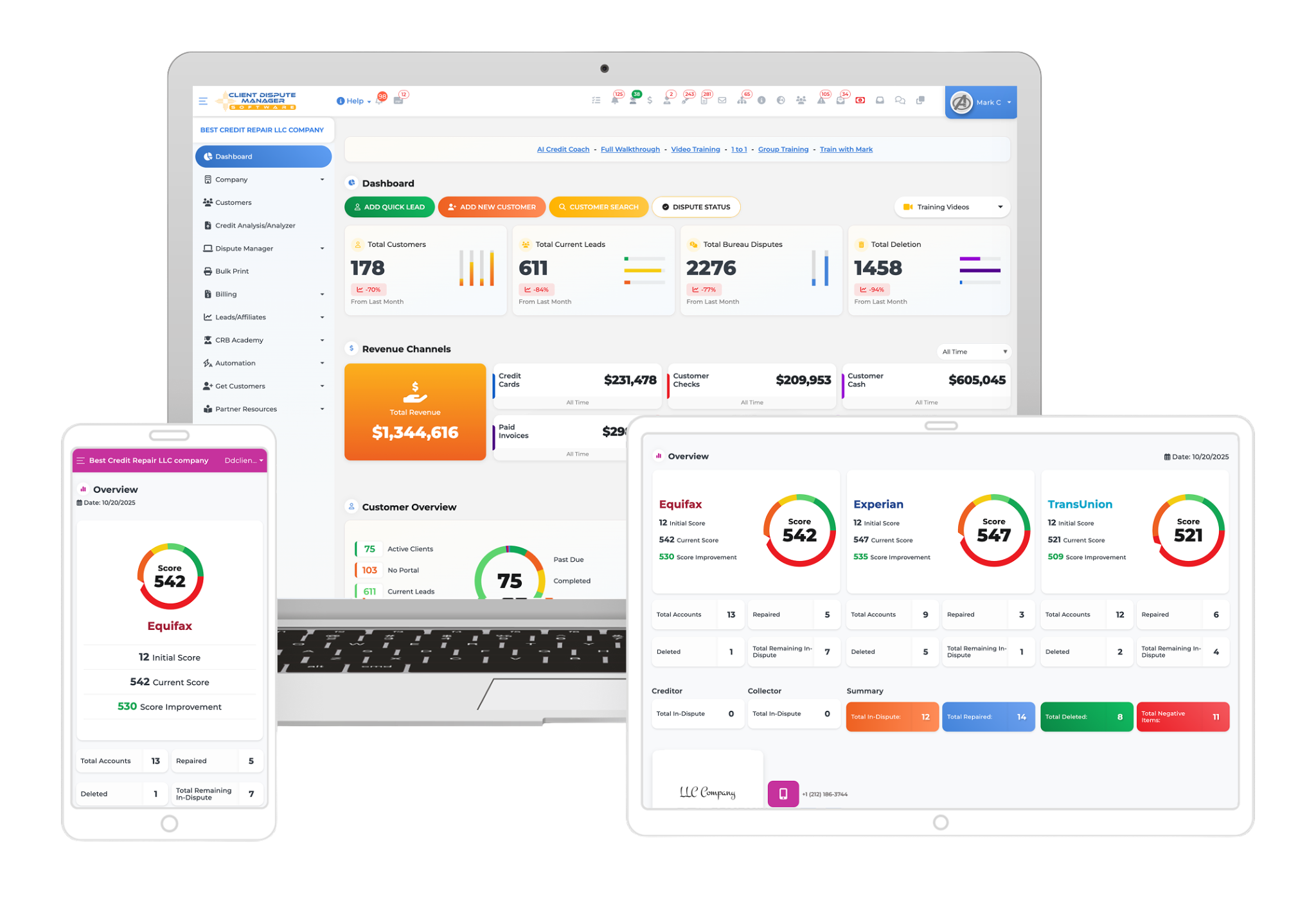This content is a transcript of the video above.
Okay so now, in today’s article I’m going to show you common dispute strategies that you can use to challenge an inaccurate charge off on your credit report or your consumers credit report to remove an inaccurate charge off.
This is Mark Clayborne- the Founder of clientdisputemanagersoftware.com. Your mentor and your coach and in today’s video, I’m going to show you common strategies. Ten things that you can use to challenge an inaccurate charge off on your credit report or your customer’s credit report.
Now credit repair reviews in charge off, that’s what we’re going to talk about today. As you can see right in front of you there are a couple of dispute reasons that you can use whenever you are trying to challenge a charge off on your credit report or your customer’s credit report so hang in there this video is going to be about 10 minutes long but you’re going to get a lot of value out of it.
So dispute reasons whenever you’re challenging any inaccurate information on a consumer’s credit report. You have to have a reason why you are challenging this information, right? You’re not going to just say it’s not mine that dispute strategy is old, it’s done and you don’t want to dispute like that anyways.
1. Wrong Balance
Dispute reason one, it’s the wrong balance. So if you are looking at your credit report or if you look looking at a consumer credit report. You want to take a look at the balance, is the balance correct? Now the only one that’s going to know then whether it’s correct or not is you or the consumer.
Now you would know if the balance is correct or not but sometimes the creditor ads on all these additional fees. So more than likely the balance is not correct. So you can challenge it based on that, okay?
2. Creditor & Collector Reporting At The Same Time
Another dispute reason, dispute reason two would be the creditor and the collector is reporting it at the same time. So it’s kind of like a duplicate reporting. The credit is reporting the charge off and the collector is reporting the charge off.
Now, how can the collector and the creditor both report a charge off on the credit report, only one person can report that charge off. The creditor can’t report it and the collector can’t report it. So there’s a problem there, right? So you just have to have a skilled eye to see that there’s something wrong with this particular account on your credit report.
Again this is another dispute reasoning that you can use to challenge inaccurate information because it’s not correct. It’s not reporting a hundred per cent accurate, right. So the Fair Credit Reporting Act states that it has to report a hundred per cent accurate.
3. The Open Date Is Wrong
The open date is wrong so when you’re looking at the credit report, you’re looking at what? The open date, when did this account, when was it open right. So if you see that the open date is wrong, so you know that the reporting is not correct. They’re not reporting it a hundred per cent correct.
So the Fair Credit Reporting next states again that anything that’s reported on a customer’s credit report has to be reported a hundred per cent correct. So not only can you dispute this with the credit bureaus but you can also dispute it directly with the creditors stating hey look dude you’re not reporting this correctly, it’s wrong.
I didn’t open this account on this date. I open this account on that date. You need to fix it or delete it from my credit report. These are some dispute reasons you can use.
4. Date Of Last Activity
What does the date of the last activity mean? The last date there was any activity on that particular account was charged off. The last time that you made a payment, right. So that’s what date last active means. It means the last time you or one of your customers made a payment on that account.
Now when you look at the credit report, sometimes the creditor or the collector, especially the collector, buy the charge off from the creditor and then try to re-age your account and make the date of the last activity a more recent date like today for example. So that’s the re-ageing of an account. So the date of the last activity is wrong is a problem.
5. Pay Per Deletion
Now if you are a skilled practitioner in credit repair t, then you already know what pay for deletion is, but if you’re new and trying to repair your owed reports, then you don’t know what pay for deletion is. So pay for deletion is you’re offering the creditor or the collector a certain amount of money; in return, they will delete the item from your credit report.
That’s what pays for deletion. So this is another way if all your dispute efforts fail. Then this is another way to get the inaccurate charge off, f your credit report because sometimes creditors and credit bureaus can be very stubborn when it comes to assisting consumers with repairing they’re owed, negotiate a pay for deletion credit, and I’ll give you the full balance in return you delete it off my credit report. Again we’re talking about credit repair reviews and charge-offs
6. Settle In Dispute
Now, this is another way, this is another strategy that you can use to get inaccurate information off of your credit report or your consumer credit reports if the credit bureaus and the creditors are having or giving you a hard time. You can settle this debt for pennies on the dollar. Fifty percent, a hundred dollars.
You can settle this debt for pennies on a dollar right and then after it’s settled it’s some improvement in your credit score. Then you can go back and look at it again on the credit report once it’s settled. See if there’s any inaccurate reporting and dispute it again you see.
Now the creditor or collector really doesn’t have any investment really in responding to your dispute because they’ve already had already settled it out. So there’s another way you can do that okay.
7. Payment Arrangement To Remove
Now, this doesn’t always work but sometimes it does work and a lot of creditors’ original creditors they will give you this “oh we can’t do this, you know we can’t do that. It’s the policy and it’s the procedure and we have to report it one hundred percent accurate, which is true but they also make their internal rules right.
So you can also ask them, “hey look if I set up a payment arrangement with you, would you forgive a couple of delayed payments or if I set up a payment arrangement with you, will you remove the discharge of the credit for.
Now good luck with the creditor. Now this will work a lot better with the collection agency because they don’t care you know there’s scum anyway, so they couldn’t care less, they just want their money but you’re going to have a hard time with the creditor if you use this strategy alright.
8. Violation In A Lawyer
This is usually the one I go to first before I use all those other ones. I usually send the first dispute round on first and that doesn’t work and if I find a violation now with this strategy you have to be trained to find the violation.
You have to know what the violation is, if you don’t know what the violation is you can’t leverage it right.
So if you find a violation with this charge off you will address it with the creditor or with the credit bureau and if they don’t fix the error, step round or step 2 or round 2 would be to take this account and give it to a law firm a fair credit reporting act lawyer, who can fight for you and get the inaccurate charge off removed, settled and give you some money too at the same time for the creditor or the credit bureau violating your rights.
9. Still Trying To Collect.
I love this one too. There’s a lot of controversy around the creditor sending you a 1099 and reporting it to the IRS, writing it off as a bad day but yet they are still trying to collect from you on your credit report. There’s a lot of case law around this there’s a lot of different opinions.
Can the creditor still try to collect and write it off at the same time? Some courts say yes, some court say no. It’s all over the board actually. So in my opinion I just don’t think that if they’re going to write it off as a bad debt they still should be trying to collect on it you know there’s law firms out there that will handle these type of cases.
You can try to use it as an argument hey why are you trying to collect this balance when they wrote it off and then they sent it to the IRS and now the IRS is making me pay taxes on it but yet creditor you are still trying to collect the money. It’s like I’m paying twice. It’s kind of crazy right.
10. Pay The Full Balance & Then Dispute.
So this is another one where you pay the full balance to get the credit score bump. You pay the full balance to get the credit score bump and then you go back right zero balance on the charge off and then you re look at it for inaccurate reporting because just because you paid it, it doesn’t mean that the creditor is still reporting it correctly.
The laws clear there, right? Alright so that’s it those are the common strategies that we use. I hope you got some value from this video. This is Mark Clayborne your mentor, your coach and your lead generation master. I want to give you guys something free. I got a big event coming up this week.
The credit repair business and lead generation mastery event if you want to learn more about credit repair, running your credit repair business and lead generation go ahead and visit me come see me at clientdisputemanagersoftware.com
Bonus: Now that you have read this article, why not take your new skill and start your own credit business helping others? We have free training that can help you do just that.
Click here to learn more.


